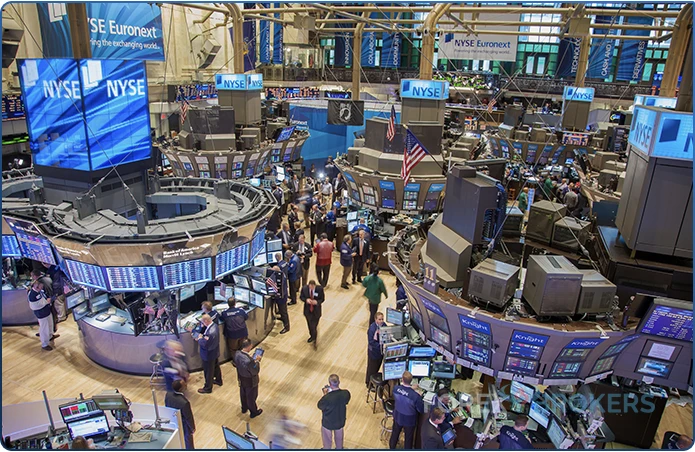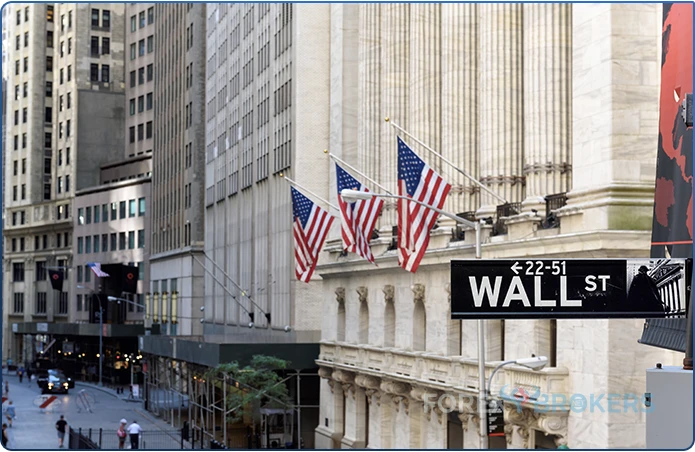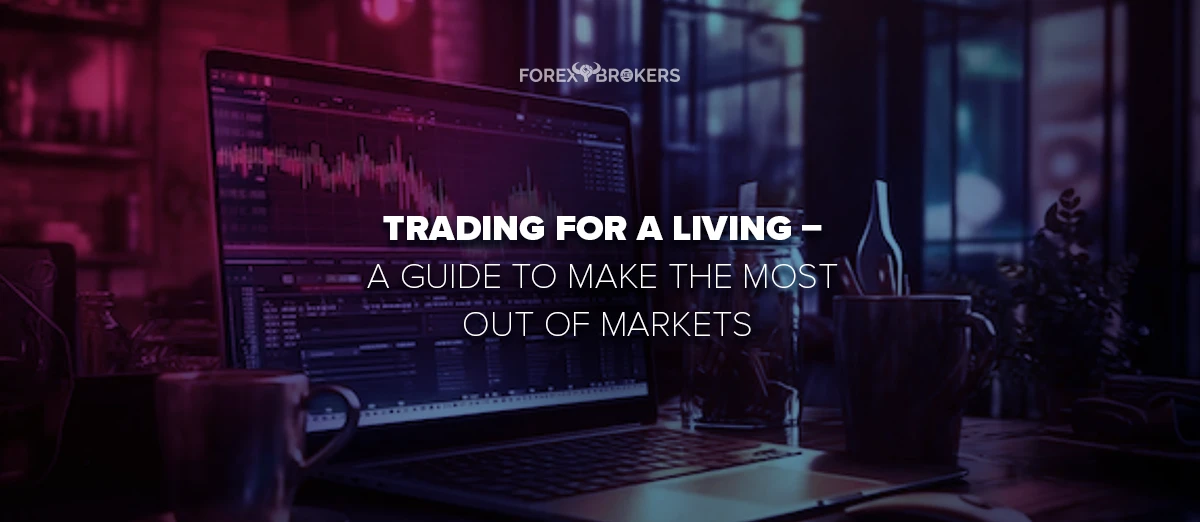As individuals, we are bombarded with commercials about financial markets everywhere we go. Just open the Internet and do some searching, and it is impossible not to come across an ad for a brokerage house offering its services.
Or, just watch a football game. In Europe, for example, brokerage houses sponsor major football teams; if not, they advertise during games to tens of thousands of people and those who watch the game at home.
This is because online brokerages strive since Internet penetration has reached more and more households. Nowadays, everyone in the developed world has access to the Internet, and the adoption rate has grown significantly in emerging, frontier, and developing markets, too.
Therefore, the growing potential for online brokerage houses is huge. But as always in monopolistic competition, profits attract competitors.
As such, the industry is dominated by stiff competition, so brokerage houses compete to attract more traders and retain the current ones. But an active trader can only be a successful one; otherwise, in time, there is no point in trading anymore because losses mount.
True brokerage houses invest in educational materials and support the trader all the way because they gain commissions on every trade, winning or losing one. As such, a broker should be a true partner for the trader in the trading journey.
But, the broker cannot trade for the customer. It is merely an intermediary that transmits the orders to the market. For its services, it charges a fee – just like any other company charging a fee for its services.
Therefore, it is the trader's responsibility to be successful. But trading profitably is one thing and trading for a living is another.

What Does It Mean Trading for a Living?
It means a full-time job. And this is, perhaps, one of the most challenging and demanding jobs in the world. Advertising makes it look easy to trade. It is easy, indeed. But to trade for a living implies being successful. Bills come at the end of each month, responsibilities mount, and you, as a trader, must deliver.
Think of it in comparison to a day-to-day job. At the month's end, someone with a regular job receives a paycheck. No matter what – all it needs to be done is show up at work and do the best to fulfill the tasks.
When trading for a living, that does not always work. You may be ready to give your best, but the markets may not move. Therefore, even if you are ready, focused and willing to give your 150% daily, you may do nothing because markets do not move. Markets do move, and often without reason. But sometimes, they simply don't.
Yet, as a trader, you need to perform. Each day counts, and at the end of the month or quarter, your balance tells you how well you did.
Trading for a living means great responsibility. Your opportunity cost (i.e., the cost of not doing something else) is so big that you must have faith that your trading activity and outcome are worth the effort. Nothing will affect you as a trader than the psychological part of the process. Let's think of both technical and fundamental traders.
Technical traders have a strategy based on interpreting charts. They study historical data, make a plan, and then act.
But what charts don't teach you when you trade for a living is the psychological aspect of a trade. Can you hold it until the market reaches the take-profit level? Or, can you sit tight, seeing the market getting close to your stop-loss level?
Fundamentally, you may end up being bullish or bearish about something. You buy or sell, only to see the markets do not move. Time is key here, and your strategy must account for it.
What Is a Trader?
This is one question you must know the answer to because each trader's answer is different. Theory classifies market participants into speculators, traders and investors.
Trading speculators are short-term traders. They focus on short-term market moves and do not like to keep a trade open for a long time.
Traders focus on the medium-term. Swing trading is suitable here, meaning a trade may take from a few hours to a few days but not much more than a couple of weeks.
Investors have a long-term focus. Therefore, they use fundamental analysis and only look at charts on large-enough timeframes that allow them to ignore the day-to-day noise.
Despite the distinction given by the time horizon for a trade, everyone belonging to these categories is a trader. The only difference is in the number of completed trades in a given period. Naturally, speculators trade more frequently than swing traders or investors.
A trader bets on the future market direction. If the trader is right, a profit is made. If not, a loss is marked.
But when trading for a living, the trading outcome over a period must be positive. This puts additional pressure on the one who trades for a living compared to a trader who is just doing it as a hobby.
Trading is not a regular job. Sometimes, the markets do not move at all. Some other times, they move so fast that the trader needs to pay additional attention to money management.
A trader must know how to diversify the portfolio. Regardless of the markets traded, diversification works to the trader's advantage.
What You Need to Know before Trading for a Living
The chances to succeed in the trading business are very slim for the retail trader. This may be discouraging to many, but it represents the truth. Now, it does not mean that retail traders have no place in this industry. It only means that the road to success is long enough and extremely difficult.
We don't talk here about traders who do this as a hobby after the regular day-to-day job hours are over. For these, the danger is that they are forced to trade only in a specific time slot when the market conditions might not be appropriate for trading.
For example, consider an FX trader from London who trades in the afternoon after a regular eight-hour job ends. Most likely, he or she would be active in the market after 17:00 hours.
By that time, most of the price action in Europe is over. Moreover, most of the important economic data from the United States was also released. Hence, the lack of liquidity and market movement creates an unfriendly environment and the trader would have it even more difficult to succeed in the long run.
Here are a few things you need to know before trading for a living:
- Your competition
- What moves the markets
- When the markets move
Know Your Competitors
As part of financial markets in the last several years, one could not have missed the changes in the market regulations. A recent change stipulates that forex brokers should display the percentage of unprofitable traders.
A quick look on the homepage would reveal that over 70% or more of the retail traders typically end up losing money with any particular FX broker. But the broker gains a commission for each trade, winner or loser, so it should support both categories. No broker wants to advertise such "performance", but regulators require it so that the trader knows what may lie ahead. Often, brokers are competitors in the market but represent a small part of it. Other retail traders are an even smaller part.
Think of your true competitors in terms of central banks, big commercial banks, algorithmic traders, sovereign wealth funds, institutional investors, etc. These market participants have more resources than retail traders, not to mention an army of researchers and traders at their disposal.
Mathematicians of all kinds are employed in the algorithmic trading business and so on. Therefore, a retail trader would be better off following the market and not fighting against it.
What Moves the Markets?
Besides competition, the next thing to consider is what moves the markets. Economic data is one thing - central banks' decisions and central bankers' speeches are another. Financial markets also move in sympathy. That is, they tend to be very correlated.
For example, a drop of 2% or more in the Nasdaq 100 index, also known as the index reflecting the tech sector, would also have implications for the cryptocurrency market.
Also, volatility in one corner of the overall market will surely spill to other markets, too. Therefore, a trader needs to be alert to anything that may move markets – from classic sources, such as economic data and central banks, to unusual sources, such as geopolitical events, international conflicts, natural phenomena, etc.
When Do the Markets Move?
Markets do not move all the time. Naturally, depending on the trading strategy, one may not need the markets to move much.
If the trader uses a strategy based on algorithmic trading, then the profit targets are very small. Therefore, the market may not move much and the strategy may still outperform.
But in general, the markets spend most of the time in consolidation. That is also valid for markets known as being very liquid, such as the FX market.
The best example comes from the FX market. Very often, traders know in advance what are the events ahead to move the markets. If the Federal Reserve is supposed to change the funds rate but the market is not sure about the size of the rate hike or cut, it will not move until the Fed releases its decision. Hence, in the meantime, the best course of action is to do nothing.
The time zone where the trader lives is also important. If the trader lives in a time zone different than the one when the most important market data is released, he or she will be at a huge disadvantage.
What You Need to Have before Trading for a Living
Now that we have explained the risks and expectations to have when trading for a living, it is time to move to the minimum to have before diving into financial markets. Here is a list to consider, and, by all means, it does not cover everything:
- Capital
- Patience
- Experience
- A broker
- Adequate infrastructure
Capital
This is one of the most delicate parts of trading for a living. When doing so, the trader must realize that they are forfeiting the regular income of a day-to-day job.
When having a regular job, the salary comes at the end of the month without delays or any surprises. As such, households have it easy to schedule their expenses and budget everything.
In other words, there is no uncertainty involved and organizing finances is easy because there is always an inflow of cash at the end of the month.
But when trading for a living, this certainty is forfeited. Absolutely no one and nothing can guarantee that the trading activities will generate a positive outcome month in and month out.
Because of that, additional planning is needed. Before anything, you need to calculate how much the household needs every month and adjust it for the yearly expenses. Moreover, calculate something additionally for unforeseen events.
Next, set aside this amount for one year of expenses in advance. This way, you are not pressured to perform every month because rarely this is possible. Make sure you understand that trading financial markets is a tough job, and winning at this game in the long run requires a lot of time and dedication, as well as many sacrifices.
Finally, fund the trading account with sufficient capital that allows it to grow nicely. Do not overtrade and do not overleverage and more importantly, set realistic expectations.
Patience
Human nature is the biggest enemy when trading financial markets. Everyone has heard of greed and fear and what it causes long-term performance, but patience is equally important. Let us use an example. Imagine that you are counting the market using the Elliott Waves principles. At one point, you use the daily chart and enter the market expecting a third-wave extension to start.
For the third wave to extend, it must travel at least 161.8% of the first wave. Being on a daily chart, the analysis implies that the market must travel several hundred pips before reaching the minimum distance, as indicated by the Elliott Waves Theory.
Sure enough, by the time the market moves in your favor, you will be tempted to book profits. Any small pullback will appear significant enough to scare you, and you will look for excuses to exit the trade early.
This is a mistake, and the risk-reward ratio is altered because of the lack of patience. Because of that, any future losing trade will have a bigger impact on the overall trading account's performance.
Experience
This part must sound awful. It resembles the experience requirement that one person just graduating from the university must have in order to get a job – unrealistic. But this is a field where experience is needed more than ever. Fortunately, it could be achieved at any cost whatsoever because most of the brokerage houses offer a demo account to practice.
Moreover, the Internet is full of educational trading material, some good, some bad, but with a bit of filtering, one can find really good courses about trading from experience people.
Furthermore, do not overrule the importance of having a mentor. Mentors in this area are people that already traded or trade for a living and their advice may spare you from making terrible mistakes down the road.
Put it simply, what do you prefer – making your own mistakes and paying for them with years of losing in the market while learning, or learning beforehand and avoiding them? These are just a few ways you can gain experience before entering the markets and trading for a living. Once again, try to get as much of it as possible.
A Partner in Your Broker
The increased Internet penetration worldwide led to the widespread of online trading. Stiff competition among brokers emerged, and they quickly became sponsors of big athletic teams as one way of gaining visibility.
A true broker should be your partner in the trading journey. A true broker you want to deal with should not be a market maker. Not that it is anything illegal to be a market maker, but some ethical issues arise when trading against your customers. Hence, one never knows what the broker is willing to ultimately do to win, so it is better to avoid these brokers.
A true broker should strive to acquire new customers, to retain the current ones, and care for both the traders that win and the ones that lose. Everything matters in the trading journey, and the brokerage house should offer the best possible conditions.
Adequate Infrastructure
To start with, where will the trading take place? If it is from home, make sure you have a separate room for it. And even so, privacy is needed. You will need it when the house is full. For instance, if trading from Europe, you would want to be in front of the charts when the Federal Reserve of the United States releases the FOMC Statement and when the press conference takes place. Typically, this is done every six weeks, on a Wednesday evening in Europe, so you'll need a place as a trader to make the most of the upcoming volatility.An office would be nice, but this would require additional costs. Moreover, office hours would easily be extended ones, as illustrated by the FOMC example above.
The next thing to worry about is a stable Internet connection. Make sure you have a stable Wifi network and that the provider is one to trust. Besides a laptop and desktop, a smartphone is handy. All brokers have apps that can be used in times of emergency when you would want to quickly exit the market due to unforeseen events. Also, when traveling, smartphones are a great way to monitor the market and adjust money management when needed (e.g., trail the stop on a winning position).
Not all brokers are the same. For instance, depending on where the servers are located, the time on the trading platform may differ, directly impacting the charts.
This may not be obvious on the lower timeframes, such as the hourly chart, but it is obvious on the bigger timeframes, such as the daily or weekly ones. Suddenly, the daily candlestick begins and ends at different hours, and this may have a big impact on a technical strategy. In other words, make sure you know what the trading conditions the broker offers and that they suit your trading style and strategy.

You Don't Need to Trade Just Because Markets Are Open
Financial markets are open 24/5 and, in some cases, 24/7. If you are in the cryptocurrency markets, the trading exchanges are open over the weekend, too. The stock market is opened a limited time during the working days, and closed over the weekend. However, events in between may affect the opening prices.
The FX market is open 24/5. As a trader, you cannot monitor the market non-stop for five days, day and night. Therefore, a plan needs to be in place before trading.
As explained above, the markets are almost always open. But that does not mean that you need to trade only because you could do so. Trading should come at the end of a plan. It is better to wait for the market to move before acting.
Imagine you are bullish on the USD/JPY and according to your calculations, it should travel another couple hundred pips above the most recent higher high level. What is the best way to trade it? Straight at the market or to wait for the price to make a new higher high and enter later?
Naturally, the second option is the right answer. Patiently waiting for the market to give you proof of life is essential in successful trading. If it is not moving, it is not moving – you will act when and if it is doing so.
Keep in mind that there is always an opportunity in the markets. Therefore, as a trader, you will not miss anything by waiting for the market to move first and then you.
Set Realistic Expectations
This is as tough as it can be. Remember what was said earlier – the performance calculation is on a yearly basis, as you already have a buffer for living expenses. So, before the start of the new trading year, you must set a goal. How much do you target for the next year?
Doing a little research might help. What were the returns of great traders over the years?
You'll find out that consistent returns are possible but not consistent abnormal returns. It also depends on the markets traded.
For example, algorithmic traders use robots that automatically scan the markets for quick trades. In the FX market, such traders rarely exceed 10% a year and the quant industry trades for the 8th or 9th digit in an exchange rate. However, because they run their algorithms on large trading accounts, the performance is enough for what they have already planned.
A realistic expectation should consider everything in a trading year – holidays, summer trading, account for periods of market inactivity and so on. During a year, many things may happen, as exogenous factors may impact financial markets drastically.
Take 2022, for instance. Following the resurgence of financial markets after the 2020 COVID-19 pandemic, 2022 started with the equity markets at the highs, as seen by the US stock market indices that ended 2021 at record high levels.
But things quickly changed. The Fed began talking hawkishly and raised the rates. Moreover, Russia invaded Ukraine, sending energy prices higher and, implicitly, inflation. As such, volatility increased in all financial markets, and many correlations were broken.
Therefore, it is nice to plan in advance, but you should be ready to adapt your plan as quickly as possible. One way to do so is to use appropriate risk-reward ratios and a sound money management plan.

Use Appropriate Risk-Reward Ratios
A risk-reward ratio refers to the reward expected from a trade in relation to the risk taken. A reward should always exceed the risk by a factor of at least 1:2 for the ratio to be considered appropriate.
Put it simply: first, you look for your invalidation level. What would invalidate the trade? If you need 50 pips as a stop, then the reward, or the take-profit, must be set at a minimum of 100 pips. Hence, for every pip risked, you stand up to make two if right.
Why are risk-reward ratios important?
First, they imply planning is in place. Second, by using a risk-reward ratio of 1:2, you may have two consecutive losing trades and one winning trade and still break even (if the trading size is the same).
Of course, one may aim at bigger risk-reward ratios, but ratios more than 1:3 are unlikely to be achieved in most markets.
Sound Money Management Principles Saves You in the Long Run
There is risk in everything we do, but there is more risk when trading your own capital in financial markets. We use insurance to hedge against risk, and traders use money management rules to protect against unwanted losses.
We already mentioned risk-reward ratios. They should be part of any money management plan.
Besides that, think of risking only a small percentage of the trading account on any given trade. Also, use pending orders as often as possible because they indicate discipline and a trading plan that will eventually reward you.
Keep Objectivity
Objectivity is key in trading. We tend to favor certain scenarios to the detriment of others. As a trader, you may want to favor one particular trade in the detriment of another course of action.
For instance, you might be from Europe and believe in the European project and the common currency – the euro. As such, you'll likely favor being long the euro and avoid shorting it.
But an objective mindset should help you avoid making such mistakes. In other words, as a trader and speculator, one needs to be ready to go long and short with the same ease, regardless of their own personal beliefs.
Don't Bet the Farm
From time to time, some trades may be so obvious that you might feel that this is it – this is the moment to make it big. Never bet the farm on any given trade and keep a humble attitude. The markets may stay irrational for a long time before proving you right. Therefore, betting on the farm is never a good approach. Instead, test your ideas and setups by using proper money management and avoid unnecessary leverage and exposure.
Markets Always Open the Next Day, with or without You
This comes in close relation to the previous paragraphs. Sometimes, you will take a bigger hit than normal, and you'll end up feeling that you want to make up the loss quickly. Most traders increase their exposure on the same market direction, overtrade, and take an even bigger hit.
One way to avoid that is to step away. Keep in mind that markets will open the next day, too and will be there with or without you and your trades. As such, use plenty of time to rest and come back stronger with a new strategy and trading plan in mind.
Mind the Economic Calendar
The economic calendar is a great feature to have because it presents the economic data and the events that will impact financial markets in the period ahead. Therefore, make sure you check it well in advance to know what will impact the markets tomorrow, in the days ahead, and even in the week ahead.
By knowing this info, you'll know when it is the time to sit in front of the screens, when to do something else when to be actively involved in trading, and so on. In other words, an economic calendar is a great tool for helping you build a sound money management system.

Focus on the Long Run
Even if you take profits early, the focus should always be on the long run. For example, if the NFP or Non-Farm Payrolls is scheduled on a Friday, but the next Wednesday, the European Central Bank meeting is on the calendar, you might want to trade the EUR/USD during and after the NFP keeping in mind that the ECB comes next Thursday.
Also, do not be afraid of looking at bigger timeframes, such as the monthly or weekly charts. They offer direction and a long-term perspective, helping you to navigate the day-to-day market swings.
Costs Associated with Trading
Trading costs must be accounted for. Swaps, withdrawals and deposits, and taxes, to name a few, will diminish the gross return.
Swaps
A swap is positive or negative and mostly reflects the interest rate differential between the two central banks responsible for setting the monetary policy in a currency pair. Most of the swaps will be negative, and so, by holding an open position overnight the broker will deduct the swap cost from the balance of your account.
Withdrawals and Deposits
Depending on the deposit or withdrawal method, they may come with a cost, too. Naturally, if following the plan mentioned in this article, then these costs do not account for much, but by withdrawing and depositing often, you need to account for them too.
Taxes
This is where the focus should be in terms of the costs associated with trading. Taxes take a big chunk of your trading profits, so you must plan carefully.
Depending on the country you live in, taxation on capital gains differs. You may end up paying less in some parts of the world and more in some others, but make sure you understand that taxes must be paid.
Conclusion
Trading for a living differs in all ways possible from trading as a hobby. It should be treated as a job, which may end up being the toughest job in the world.
Financial market participants range from inexperienced retail traders to huge banks, sovereign wealth funds, institutional investors and central banks, to name a few. This is the competition and these are the forces that move financial markets. Hence, the way to do it is to interpret the market direction as a result of big players' actions and act accordingly, using a sound money management plan.
This article tried to cover most of the things to know before trading for a living and after trading starts. For those loving a challenge, trading is a great arena to test your skills. But even the most talented traders have a tough time in the long run without proper preparation beforehand.












